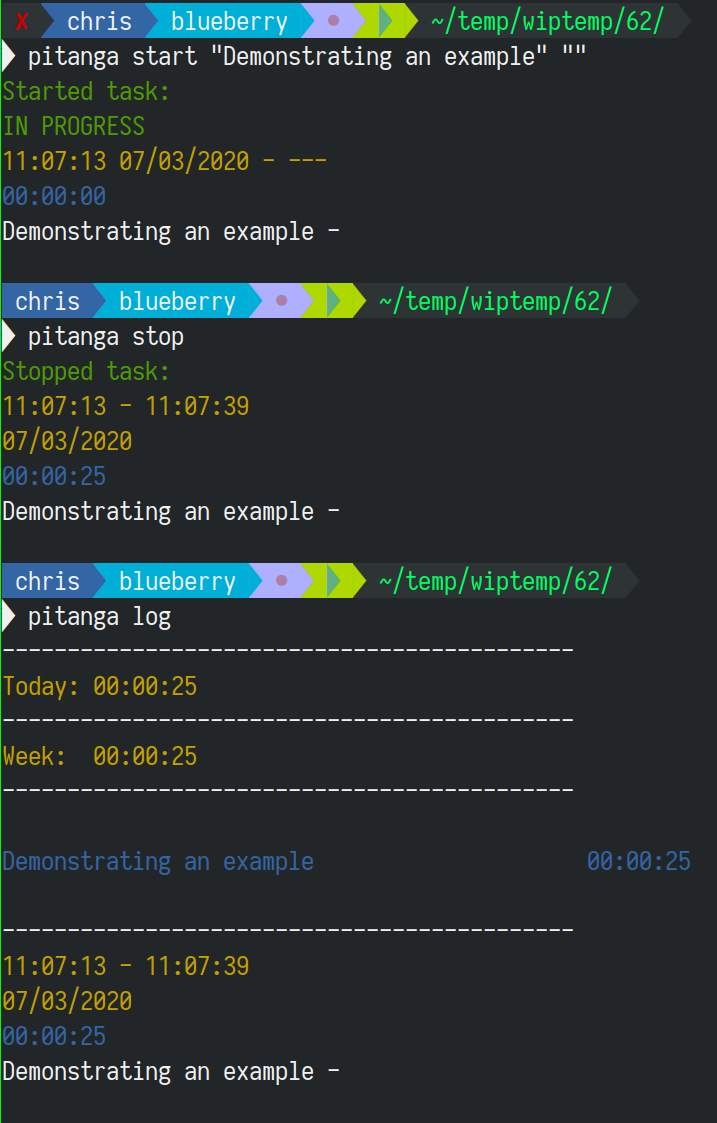An efficient cli time tracking application.
- Influenced by
git log - Storage in a simple
log.jsonfile in the current directory - Colored syntax
- Export functionality
- Two views, individual entries, or a more general overview where tasks are grouped by day.
It adds efficiency to logging time - minimizing keystrokes compared to every other time tracking software I've tried. It adds efficiency to viewing log history.
Start a task:
$ pitanga start "Demonstrating an example" ""
Started task:
IN PROGRESS
11:07:13 07/03/2020 - ---
00:00:00
Demonstrating an example -
Stop a task:
$ pitanga stop
Stopped task:
11:07:13 - 11:07:39
07/03/2020
00:00:25
Demonstrating an example -
View the log:
pitanga log
--------------------------------------------
Today: 00:00:25
--------------------------------------------
Week: 00:00:25
--------------------------------------------
Demonstrating an example 00:00:25
--------------------------------------------
11:07:13 - 11:07:39
07/03/2020
00:00:25
Demonstrating an example -
View the log grouped by day:
pitanga log --first=20 --group-by "1d"
Mon: 01:00:22 ██
Tue: 25:56 ▌
Wed: 08:49
Thu: 01:20:59 ██▎
Fri: 02:47:19 █████▎
Sat: 00:00
--------------------------------------------
Today: 00:00
--------------------------------------------
Week: 05:43:29 ▎
--------------------------------------------
investigate nginx starting correctly on boo 00:01
fail2ban 18:53 ▎
general investigation 19:02 ▎
logging outgoing connections 49:03 █▎
addition of deploy-at-boot systemd unit 55:10 █▌
cron for sync 01:10:03 ██
travis v2 deploy investigate 02:11:13 ████
--------------------------------------------
02:47:19 | 2020-08-07
01:38 | travis v2 deploy investigate
00:02 | travis v2 deploy investigate
23:26 | travis v2 deploy investigate
13:51 | fail2ban
05:02 | fail2ban
00:13 | logging outgoing connections
20:10 | logging outgoing connections
24:19 | logging outgoing connections
04:20 | logging outgoing connections
00:01 | investigate nginx starting correctly on boot
01:17 | addition of deploy-at-boot systemd unit
53:52 | addition of deploy-at-boot systemd unit
12:07 | general investigation
06:54 | general investigation
01:20:59 | 2020-08-06
01:39 | cron for sync
32:29 | cron for sync
18:00 | cron for sync
09:05 | cron for sync
05:42 | travis v2 deploy investigate
14:03 | travis v2 deploy investigate
- It saves the data in a single log.json file - so could be deleted by accident? Make frequent backups!
- No timezone support (everything is done in UTC).
pitanga --help
PlatinumPitanga
Usage: pitanga (COMMAND | COMMAND | COMMAND | COMMAND | COMMAND)
Available options:
-h,--help Show this help text
Available commands:
start Start a new task
stop Stop the task that is currently in progress
resume Resume the last stopped task
log Log
export Export
pitangaLog --help
Usage: pitanga log ([--first ARG] | [--last ARG])
Log
Available options:
--first ARG show first n
--last ARG show last n
-h,--help Show this help text
pitanga export --help
Usage: pitanga export [--raw-json] [--group-by-day] [--group-by-day-and-task]
[--from ARG]
Export
Available options:
--raw-json Export raw values as JSON
--group-by-day Sum aggregate group by day
--group-by-day-and-task Sum aggregate group by day and task
--from ARG dd mm yy
-h,--help Show this help text
nix-build -A platinumpitanga.components.exes.pitanga
I think the nix build is broken. Have been using stack instead:
stack build
** One word: FZF **
These aliases are highly recommended:
alias ptl="pitanga log --last 5 | less -R"
pts () {
echo "$#"
if [[ "$#" = 0 ]]; then
pitanga start "$(cat tasks.txt | fzf)" ""
else
pitanga start "$(cat tasks.txt | fzf)" "$@"
fi
};
alias ptsp="pitanga stop"
alias ptr="pitanga resume"
I have each "project" in a directory, and within each directory I have a helper tasks.txt file.
For example tasks.txt might have the contents of:
work on abc
investigate xyz
etcxyz
